Travel Trailer vacationing has become a huge alternative for those who don’t like the restrictions of renting a room at a resort motel or hotel or traveling out of the country.
It gives them more of a variety of choices and travel freedom to literally camp out in style almost anywhere you decide to stop along the way. Due to the popularity and growth of the RV industry these things ‘have come a long way, baby!’
But how good would they be for the serious prepper to use as a useful bug out hideout, temporarily, or even for possible, long term or even permanent off grid survival living?
Here are some things to consider…
The Good, the Bad, the Ugly
Travel Trailers, also called RVs because they fall Into the ‘Recreational Vehicle’s licensing category in most states, have been around for a long time and come in a variety of sizes and configurations.
If money is no big deal when it comes to your comfort, style, and amenities, you can go hog wild and slob crazy feasting your eyes, and wallet, on one of the top of the line Motor Homes. Which are appropriately nomenclated as such because they are, literally, a very nice ‘home’ with a motor in it that allows you to drive it around like a bus instead of hauling it behind you.
These come in three styles. Wow, Awesome, and OMG-UnFreakingbelievable! The last category being more adapted for the rich and famous, and is what you usually see the big music stars driving across country in when they’re on concert tours.
These beauties can sometimes run upwards of seven figures depending upon luxuries. But even the ‘Wow’ models are not cheap and go for anywhere between seventy thousand to a quarter million for a nice one that comfortably sleeps 4-6 persons.
And technically, guess what? These are pretty much already completely self-sustained and off grid right out of the showroom door. Especially if it’s a diesel. You don’t even have to plug it in somewhere for electricity every time you stop if you keep the rather large fuel tanks filled.
And you don’t even need to keep the vehicle’s motor running. They have deep cycle batteries and a small compact onboard diesel generator already hooked into the power system and connected to the main diesel fuel tanks just for continuous charging of the batteries or direct off grid electricity in the newer models!
Click HERE to Get the World’s Smallest Battery, That Powers Your House For More Than 2 Days!
A Tough Choice
But would I choose one of these behemoth motor homes for off grid living? Not unless it was FREE!
Because of the comparison that for the same cost of a higher end newer motor home one could have a nice custom off grid concrete house somewhere relatively private that’s a little more weather and intrusion resistant.
Also, there are some inherent maintenance disadvantages in large motor homes as they age like not being able to work on them that much yourself unless you’re a skilled mechanic. And you can’t just bring them to your local car mechanic in town.
Plus, when you think about it, how much actual motor-homing are you going to do to justify the enormous cost of fuel? There’s no such thing as a fuel efficient motor home and if you get stuck in the mud on a dirt road to your BOL, you are not going to push it out by hand.
And unlike pulling an RV Travel Trailer, you can’t just unhook your car or truck from it, and still have mobility. Depending upon the area of the country you want to go you would require a pricey power winch installed to help get you out of trouble on a steep or rough back road.
So all things considered, what’s the cost justification differential with a motorhome compared to a Travel Trailer pulled behind your personal vehicle? What’s the critical difference in towing your living quarters or driving a self propelled one?
Not much, until they come out with the robotic self-driving ones in a couple of years. Then this will bring a whole new meaning to “over the road vacations!” But these still would only be a sunny afternoon pipe dream for most of us anyway.
However, if you are not hauling your Country Western Band from coast to coast so you don’t need a replica of an Amtrak Train but still are enamored of a motorhome, there are many smaller models and versions that are built on a larger Chevy, Ford, or other such chassis.
They’re much cheaper, especially used, and easier to maneuver into smaller parking areas.
I know a woman who lives on the TX coast in a condo and has a small 20’ Ford motor camper with all the conveniences. It’s well stocked with supplies and water and extra fuel.
When a hurricane is forecasted she just hits the road with it and when she reaches an out of danger distance, she simply parks in the nearest Walmart or Truck Stop, steps up between the front seats into the back, relaxes on the couch, and waits out the event in comfort and safety!
She even named her motor home ‘APIAS’ for Any Port in a Storm. Not a bad idea, using your RV as a BOV so you don’t really need a dedicated BOL!
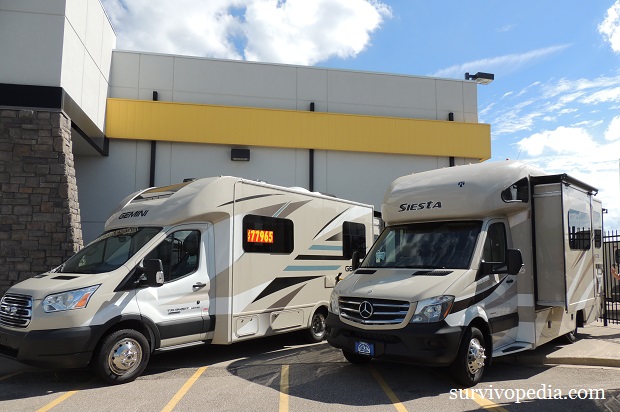
Different Strokes…
But the best ‘bang for the buck’ alternative would be one of the intermediate travel trailers, 20’ to 35’ long you are now seeing a lot of these days on the road.
In the past the larger heavier ones had a front hitch set up known as the ‘fifth wheel’. This was a heavy, bulky device based on the way the big semi-tractor trailer trucks hooked up and could only be installed in the back bed of a pick-up truck. Not on a regular back bumper area ball hitch.
Since older pick up trucks were not the ‘cat’s Meow’ of comfortable road cruising, pulling a 5th wheel trailer long distances was often tiring.
Today most of the newer larger travel trailers are made with lighter materials and advertised as ‘light weight’ RVs and the 5th wheel is becoming obsolete for RV camping. Which means you can pick one up used for a really good deal if you already have a truck and don’t mind installing a 5th wheel hitch in your truck bed.
Click HERE to Get the World’s Smallest Battery, That Powers Your House For More Than 2 Days!
But the light weight Travel Trailers (TT) changes the ball game and some really nice midsized ultra lite Travel Trailers can even be pulled by regular family cars.
The designs have changed a lot as well. They’re just as comfortable and user friendly than a modern apartment with a lot of nice amenities.
Making the Best Choice
The old saying, ‘Everything’s Nice, Until You See the Price!’ tells it all here.
Since some of us who are interested in using TTs for off the grid living already can’t afford a house and then serious additional expense of converting the house to permanent off grid solar power, the only way we’ll even get close to off grid living is by opting for a Travel Trailer instead.
So it all boils down to costs. And here’s where it gets interesting. The reality is that not only is it fairly easy to live completely off grid in a trailer, and do it for a cost that almost anybody with any income can afford.
It can also be done comfortably and relatively cheaply if you think carefully about your needs and do some diligence in planning and searching for the best deal on the right trailer for your anticipated lifestyle.
Bigger is Not Always Better
When we think of living space most of us are already thinking incorrectly for practical application. Everybody, especially Americans, always likes bigger space, and more closets, and more appliances, and so on. We’re all conditioned by society to live like that.
But is it really necessary? Not for the most part.
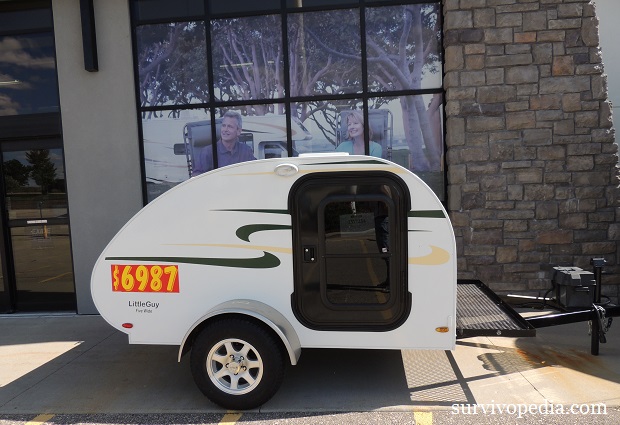
Designers of living quarters always knew that when it comes down to it, there are only three basic areas people spend their inside time in: the Bedroom, the Bathroom, and the Kitchen.
Unless you’re a teenager who thinks their bedroom is a separate apartment or you are homebound a lot, you don’t even really spend that much time in these rooms if you’re working or active. People in other countries (like Japan) live their entire lives in one room city apartments!
Even some expensive luxury condos in New York are only 400 square feet of living space which is less than a 35’ by 12’ TT with slide outs. So even if you came from a large house style of living, it wouldn’t take you long to get acclimated to a comfortable smaller size domicile.
You might even like it better?
A Well Kept Secret
There are a lot more people living in travel trailers than you would think.
In fact there is a dedicated industry that caters specifically to people who want to live full time in their travel trailer. For a monthly fee much less than an average apartment rental, they provide a spot to park with an electric service plug in and a septic system to connect your waste tank hose into.
Your TT usually has a mini-version of a regular forced air home heating system, complete with in floor heat registers/vents powered by a couple 30 or 20 pound propane tanks, also usually filled at one of these ‘”community living” Travel Trailer RV camping spots, or available exchange refills at every Walmart in the country.
So pull into one of these camper places, set up in a couple hours, plop down on your couch in front of your HD flat screen, crack open a brewski and enjoy the playoffs!
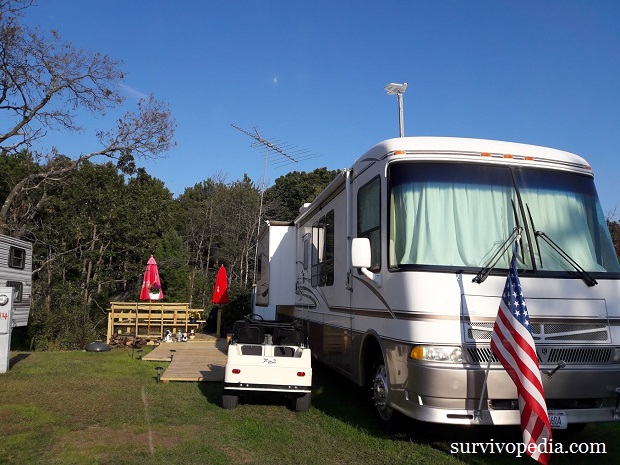
There is an entire sub-industry lifestyle revolving around the TT phenomenon. There are guides and publications like ‘Trailer Life’ and others. Outlets and dealers and resources for RVs are everywhere.
And if you’re looking to escape from the mind numbing grind, an ex spouse, or family that makes you pop Alleve tablets like a kid chunking M&Ms every time you see them, it’s pretty hard to track or find you in your TT camper if you don’t leave a huge paper trail by paying cash for most expenses.
How Hard is to Make Your Trailer Completely Off Grid
Because most of them are already wired with built in 12 volt electrical lighting and DC to AC power inverters off a back-up battery, there’s almost nothing to it.
You would simply upgrade your battery bank with a few additional batteries, and a basic solar panel charging system or small portable wind turbine or build your own system along the lines of the(name the power unit book you are selling here?).
With enough watts to cover your electric needs and you’ve now got the power grid monkey off your back!
If you want to set up to include total disconnection from municipal systems somewhere more remote on your own land you’ll need a well and a septic system.
These are not cheap but depending upon water table depths and septic system requirements in your area sometimes you can get away with a relatively inexpensive sand point shallow well.
There are several Youtube tutorials on how to dig and set up your own well pump, and temporarily you can just use an outhouse type latrine if you have to. There’s even things like electric disintegrating toilets or composting toilets now that allow you to avoid digging a complex septic system.
There are all kinds of DIY information out there about hacking easy septic systems also on Youtube about this subject if you are not in an area with strict codes.
Buying a Travel Trailer
This is the best news about off grid living in a Trailer. If you explore the market, even on Ebay or Amazon… is that you might be surprised how inexpensive a decent used Travel Trailer can be.
Many were purchased just for occasional yearly vacations that owners evolved out of and just sit around so the people sell them and they have very little wear and tear other than needing to be cleaned up a little.
Pros and Cons of Off Grid Travel Trailer Living
PROs
…some considerable advantages for the frugal prepper.
Freedom!
I know people who say that once you escape the ‘stick built’ jungle, there’s no going back to being locked into a boring ‘hood’ where all you do is try to ‘keep up with the Joneses’.
Or worry about going underwater in mortgage debt and not being able to sell if the area economy or the environment goes bad and raises your property taxes (like in Kalifreaknia, or Illinois) so high you almost need a six figure income just to own a relatively small home!
And there’s a bit of nomad in a lot of us. After all, it was the nature of early civilization to constantly move around in caravans for improved conditions.
Cost of Living
There’s no disputing the total package efficiency of living off grid in a travel trailer. Dollar for dollar including the cost of the trailer and your expenses are far less for the same services and style of living compared to a standard house construction or usurious apartment rentals.
And your cost of your off grid electrical set up equipment is usually paid for after the first year in power costs and the continued ‘free electricity’ can be huge savings in the long run.
Travel trailers are less maintenance than a conventional house and cheaper when you do have to do some.
CONs
…really not that many.
High Winds
Although you can ‘permanently’, as they say, attach or secure your Travel Trailer to the ground with posts to stabilize against high winds, I don’t know if I’d set up my TT Permanently in a neighborhood area out west known as Tornado Alley?
But not much stands up to a powerful tornado or a Cat 5 hurricane anyway so you just have to think ahead about it.
Heating
Most TTs have adequate heaters but the nature of the need of saving weight in something you haul on the road means that the walls and insulation in these units are not nearly as thick as a regular house. So this might be an issue up North and I don’t know for sure how warm a TT would be in the ‘badlands’ of North Dakota or Alaska although I’m sure you’ll find a few—even with wood burning stoves—no doubt. But there are a never ending supply of suitable living areas in this country where the climate is not yet ‘geoengineered’ enough for the standard unit heating to work just fine, So it’s really a non-issue unless your personal situation requires you to reside in a very cold part of the country.
So take your time and do your diligence. There are so many choices out there that it will pay off for you to search around. Make your choice to fit your plans. And you’ll be ‘good to go’!
Okay then, see you later on the road, and Off the Grid Monster. Don’t forget to wave!
This article has been written by Mahatma Muhjesbude for Survivopedia.





























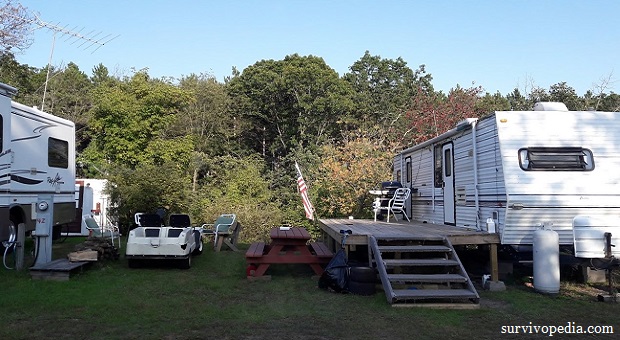
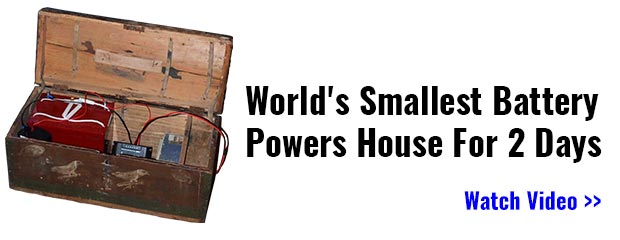























































When you are considering a “Travel Trailer” (that may Not Travel at all), – There are 7 areas that You MUST pay Attention to: 1. Frame structure and road suspension; 2. Roof structure and design (how many openings ?); 3. Insulation adequacy in roof, walls, And floor (This will vary Widely – More than you can imagine); 4. Ground clearance for rough “roadways” (Especially for 22′ plus lengths); 5. Heating and Ventilation provisions (Forget A/C); 6. Window Quality and Openings; and 7. Weight considerations (Medium is best) considering Towing vehicle. I Would NEVER Consider a “5th Wheel” Unit – for 2 reasons: a. Cross-wind Towing is dangerous at best, and b. Towing one is fraught with numerous problems, including Towing vehicle mods. and HIGH overhead clearance. Best of Luck to All of you – This CAN WORK. Bill
Biy a older one with standing pilots, on the new ones all appliances have electronics that would be destroyed with a emp. Even the slide outs are controlled by electronics.
Just a Thought – we still have our 1983 Allegro 33′ MH – You can buy it cheap. Travel trailer is already sold – 27′ Kit. Bill.
Thank You for your help today !♉️
Bill—Could you better explain your comment about 5th wheel trailers. I had a bumper pull TT and often had issues towing it in high winds or if I made a sudden steering correction. I also have a 5th wheel set-up on my Dodge RaM 2500 WHICH I USED TO PULL A LARGE HORSE TRAILOR WITH ABSOLUTELY NO PROBLEM. iT WAS AS IF THERE WASN’T ANYTHING DIFFERENT AS COMPARED TO NORMAL DRIVING. pLEASE EDUCATE ME AS I HAVE A LIMITED EXPERIENCE IN TOWING.
There is an adapter for RV 5th wheel, to a farmer’s stock trailer 5th wheel. If the trailer won’t be moved frequently, you could probably work out a deal to use the farmer and/or his truck for moving the trailer, without having to put in the 5th wheel ball in the bed of a truck. I had a 1/2 ton truck that would safely/comfortably haul a 26′ 5th wheel trailer. I would have gone a few feet longer (trailer is long-term parked somewhere) had I figured out that I could have just borrowed a 1-ton truck to move the trailer to the site.
I have vacationed in a travel trailer for as long as a month at a time and have driven across the US, north/south and east/west, several times towing that trailer. An RV is a great way to travel if you like bringing your pets with you and you hate to pack and unpack when staying in a different motel room every night. An RV that has a generator is also a great back-up to have if the power grid goes down in the summer and you want to sleep with air conditioning. Most RVs are not designed for cold weather — so be prepared to migrate south each autumn if you want to live in an RV full-time. Also, expect to have to do routine maintenance on a regular basis, just like you would with a boat, because all that rattling while traveling down the road takes its toll on every bolt, screw and latch.
my wife and I just moved from Alaska to Mid=America upon my retirement. We pulled a 30-foot camper over 4000 mails through Alaska, Canada and the northern tier states before arriving in the central US. It was a great trip until we had a blowout in Canada, (due to some of the worst road damage I have ever seen) and the blown tire tread ripped out all of the wiring of the trailer. The trailer’s breaker box was located right above the wheel well and the shredded tire tread ripped through the flooring and the breaker box’s wiring.
We had to have the trailer towed over 100 miles to the nearest repair center. Although it may seem like real ‘bummer,’ we were glad that we had a “travel trailer” rather than a “drive it” type RV, because if we had to have the “drive it” towed we would have not have had a vehicle to get around in the week the repairs were being made. Although The trailer could not be totally repaired in Canada, they were able to get the tail lights, brake lights and turn signals hooked up and the electric brakes wiring fixed so that we were ‘road worthy’ again.
I say all of this to bring out two points to those who are looking at using RV’s for “bugging out”.
1) IMHO a towed trailer is the way to go because if there is a problem with the trailer, you can unhitch and still be able to have a vehicle to get around the area. IF it had been a ‘drive it’ then we really would have been stuck out in the wilderness.
2) RV’s are for the most part a lot more fragile than a regular car or truck and need to be inspected and have a greater degree of maintenance than most people do for their regular vehicles. Also they are not nearly as off-road capable as many would think. The broken pavement / gravel / potholes of the ALcan Highway caused the tire failure which wiped out our electronics and made the trailer into a ‘tin-tent with closets’. The roads did not damage our Dodge Durango with which we were towing the trailer.
We love our trailer for RV use but also keep it stocked and consider it our ‘lifeboat’ as well – just in case we have to leave out main ‘ship’ – our house in the country.